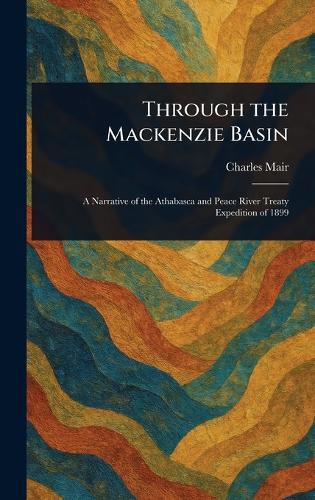Readings Newsletter
Become a Readings Member to make your shopping experience even easier.
Sign in or sign up for free!
You’re not far away from qualifying for FREE standard shipping within Australia
You’ve qualified for FREE standard shipping within Australia
The cart is loading…






This title is printed to order. This book may have been self-published. If so, we cannot guarantee the quality of the content. In the main most books will have gone through the editing process however some may not. We therefore suggest that you be aware of this before ordering this book. If in doubt check either the author or publisher’s details as we are unable to accept any returns unless they are faulty. Please contact us if you have any questions.
Embark on a journey through the vast Canadian Northwest with Charles Mair's "Through the Mackenzie Basin: A Narrative of the Athabasca and Peace River Treaty Expedition of 1899." This meticulously prepared edition recounts the expedition's travels through the Athabasca River, Peace River, and Mackenzie River regions of the Northwest Territories.
More than a simple travel narrative, Mair's account offers a valuable glimpse into Canadian history and the complex relationship between the government and the Indigenous peoples of the area at the turn of the century. The book also presents a fascinating study of the birds native to the Northwest, detailing observations of avian life in this remote corner of Canada. Readers interested in Canadian history, travel, and natural history will find this a compelling and insightful read.
This work has been selected by scholars as being culturally important, and is part of the knowledge base of civilization as we know it.
This work is in the public domain in the United States of America, and possibly other nations. Within the United States, you may freely copy and distribute this work, as no entity (individual or corporate) has a copyright on the body of the work.
Scholars believe, and we concur, that this work is important enough to be preserved, reproduced, and made generally available to the public. We appreciate your support of the preservation process, and thank you for being an important part of keeping this knowledge alive and relevant.
$9.00 standard shipping within Australia
FREE standard shipping within Australia for orders over $100.00
Express & International shipping calculated at checkout
This title is printed to order. This book may have been self-published. If so, we cannot guarantee the quality of the content. In the main most books will have gone through the editing process however some may not. We therefore suggest that you be aware of this before ordering this book. If in doubt check either the author or publisher’s details as we are unable to accept any returns unless they are faulty. Please contact us if you have any questions.
Embark on a journey through the vast Canadian Northwest with Charles Mair's "Through the Mackenzie Basin: A Narrative of the Athabasca and Peace River Treaty Expedition of 1899." This meticulously prepared edition recounts the expedition's travels through the Athabasca River, Peace River, and Mackenzie River regions of the Northwest Territories.
More than a simple travel narrative, Mair's account offers a valuable glimpse into Canadian history and the complex relationship between the government and the Indigenous peoples of the area at the turn of the century. The book also presents a fascinating study of the birds native to the Northwest, detailing observations of avian life in this remote corner of Canada. Readers interested in Canadian history, travel, and natural history will find this a compelling and insightful read.
This work has been selected by scholars as being culturally important, and is part of the knowledge base of civilization as we know it.
This work is in the public domain in the United States of America, and possibly other nations. Within the United States, you may freely copy and distribute this work, as no entity (individual or corporate) has a copyright on the body of the work.
Scholars believe, and we concur, that this work is important enough to be preserved, reproduced, and made generally available to the public. We appreciate your support of the preservation process, and thank you for being an important part of keeping this knowledge alive and relevant.